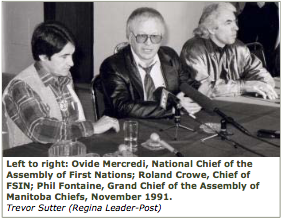
Roland Crowe, born in 1943, is a member of the Piapot First Nation and resides in Regina with his wife Brenda and their children. Over the years Crowe has worked in a variety of occupations including farming, construction, guard (Provincial Correctional Centre), and public office. His career in public office began in the 1960s when he accepted the wishes of his people, standing for two years as band councilor and six years as chief. His political career continued in the 1980s when he was first elected vice-chief of the Federation of Saskatchewan Indian Nations (FSIN), followed by two terms (over eight years) as FSIN chief. In 1995 he returned home to his farming operation, and was once again elected band chief in 1997. From 2000 to 2003 Crowe served as spokesperson of the Treaty 4 Council of Chiefs and chairperson of the Treaty 4 Executive Council, and was appointed to the FSIN Senate (2000). During his time of service with the FSIN, Roland Crowe made numerous and significant accomplishments. As vice-chief he dedicated himself to improve housing conditions and saw 1,000 low-income housing units built in urban centres through the creation of off-reserve housing corporations. He also played a key role in the development of new training and employment strategies, including the creation of local Indian Management Boards. As FSIN chief, Crowe forged important new protocols and intergovernmental arrangements, spearheading the 1992 Treaty Land Entitlement Agreement that saw an additional 1.6 million acres added to the First Nations’ land base; he saw the completion of the Hunting-Fishing-Trapping-Gathering Act, an important step in the application of First Nations Treaty rights, jurisdiction and management in the area of wildlife resources; and as one of his last achievements he helped develop a foundational agreement with the province on gaming, which resulted in over 1,100 jobs for First Nations people in the gaming industry and major wealth creation for First Nations communities.
Brenda Crowe

